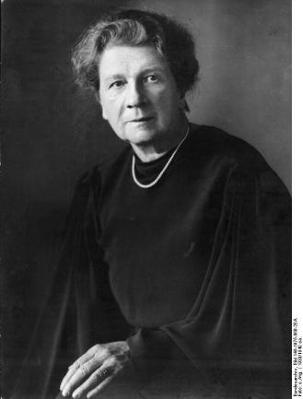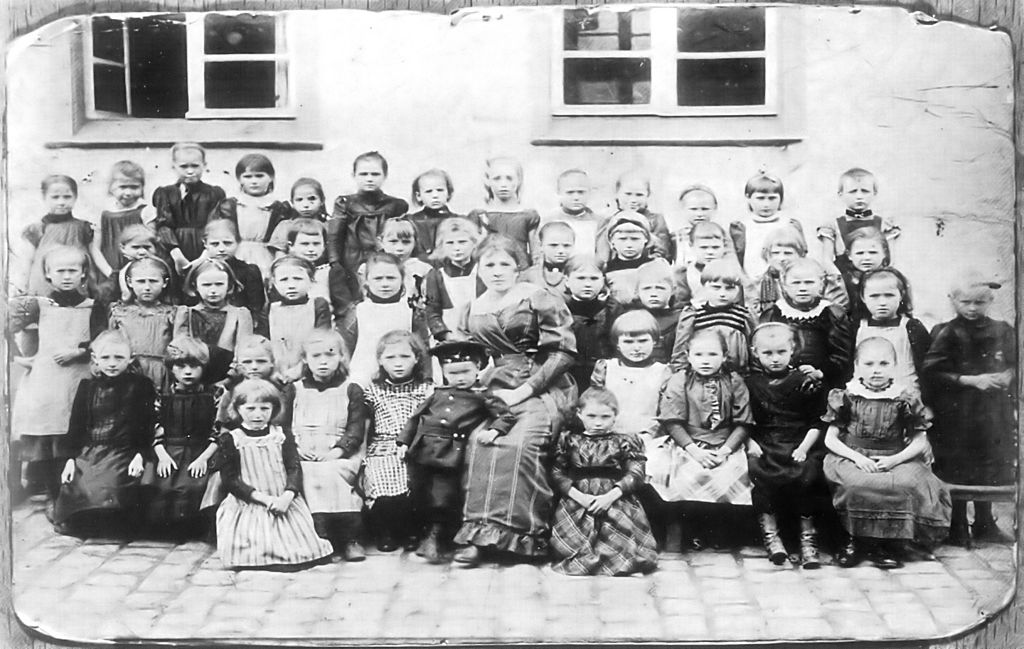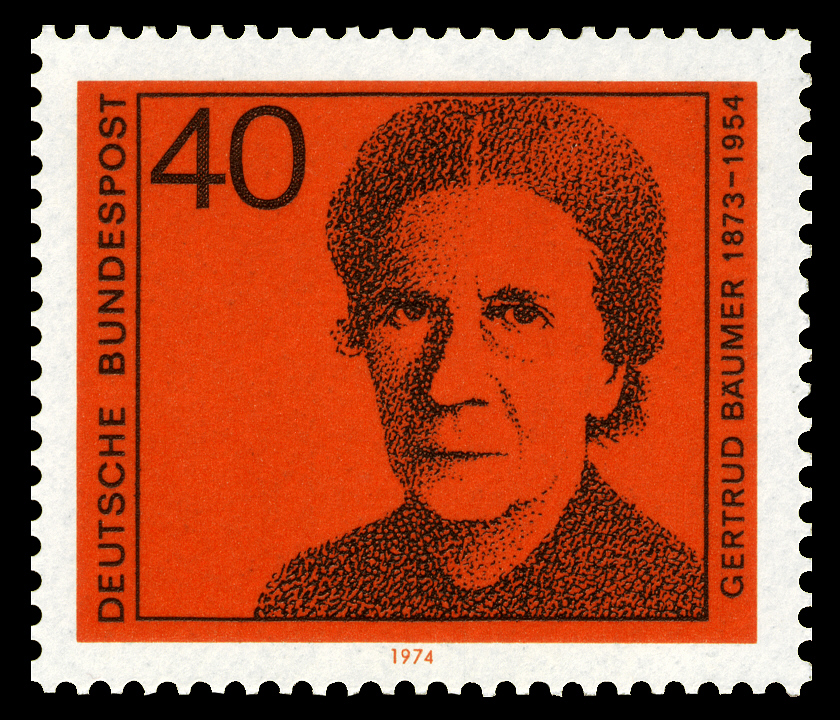Gertrud Bäumer (1873-1954)
“I firmly opposed doctrinaire ideas which tried to force masculine types of freedom onto women and tried to force women to live as men do”
Gertrud Bäumer (1873-1954) was one the most influential leaders of German’s middle class women’s movement in the late nineteenth and early twentieth century. She played an important role in the the Federation of German Women’s Associations (Bund Deutscher Frauenvereine, BDF), founded in 1893 as the umbrella organization of the bourgeous women’s movement in Germany, which existed until 1933, after the Nazis came into power.
Gertrud Bäumer was born in Westphalia and as the daughter of theologian. Her evangelical Christian background would continue to heavily influence her work the rest of her life. From 1892 through 1898 Bäumer worked as a teacher and studied literature and philosophy at Humboldt University of Berlin for a year. There, she became an active member of the General German Women Teachers’ Association (Allgemeine Deutsche Lehrerinnenverein). The Association was founded in 1890 and headed by German feminist, Helene Lange. Together, the Bäumer and Lange founded the Die Frau (The Woman) in 1893. They continued to live together and work closely on women’s issues for the next thirty years. By 1904, Bäumer became one of the first women in Germany to earn a Ph.D. in German literature.
In 1910, Bäumer gained national recognition when she was named the president of the Federation of German Women’s Associations. Under her leadership- the Federation of German Women’s Associations- moved increasingly to the right. This conservative trend in the BDF politics was reinforced when the religious women’s organizations had joined its ranks, like the German Evangelical Women’s League (Deutscher Evangelischer Frauenbund). However, not all were in favor of Bäumer’s traditional, Christian-conservative and often nationalist views. Under her leadership, the BDF was increasingly criticized by the left-liberal middle-class women’s organizations for being too traditionalist. Furthermore, the BFD also withdrew support from radical feminists who supported sexual emancipation and legalizing abortion. Bäumer’s ideal of maternal or relational feminism that believend in the nurturing role of women and her Christian. Conservative motivated led her to view abortion as criminal and contraceptives as immoral. As Bäumer’s programs and ideals were implemented across the Federation, the last traces of a more radical feminism in Germany had effectively been marginalized by the onset of World War I.
The tensions in the BDF, encompassing many different middle and upper class women’s groups with conservative to liberal political positions in the “women’s questions,” increased during the the First World War. Bäumer, Lange and others advocated for an active war support by the women’s movement and for this purpose suggested the creation of the National Women’s Service (Nationaler Frauendienst, NFD), to allow women to take an active role in the war effort at the home front. The NFD’s network sufficiently aided the public welfare system during the war. Activities went beyond those of the Red Cross, which mainly was responsible for the medical care of the soldiers. The NFD provided food provisions for families in need, gave housewives nutritional advice, and offered cooking classes. It also aided widows and their children, organized child care for working women in the war industries, and helped expecting mothers. Furthermore the NFD provided educational courses, as well as employment and legal services to women and teenagers during the war.
In line with her conservative views, Bäumer saw social work as fitting task for middle- and upper-class women in the workforce. Sensing a need for formal training of social workers following the war, Bäumer moved 1920, after the war had ended, from Berlin to Hamburg to run the Women’s School of Social Work (Soziale Frauenschule), later renamed in Social Pedagogical Institute (Sozialpädagogisches Institut). The Women’s School of Social Work was one of the first that trained women social workers in Germany and fostered a tightknit community in Hamburg between teachers, sponsors, and students. The city provided a well suited environment to establish the privately financed institution for the education of professional women social workers in fields such as youth welfare and care, reducing infant mortality, and career guidance. The school in Hamburg followed the model of the very first Women’s School of Social Work founded in 1908 in Berlin by the feminist and social reformer Alice Salomon (1872-1948).
Following the defeat of Imperial Germany in World War I and the creation of the Weimar Republic in the Novemberrevolution of 1918, German women finally gained the right to vote and were given active and passive voting right for the first election on January 19, 1919. Bäumer became one of the first women politicians in the new parliament. In total 41 women were elected in 1919. She was a member of the national parliament, the National Assembly (1919-20) and the Reichstag (1920-1932) for the liberal Democratic Party (Demokratische Partei) and assistant head of a department in the Ministry of the Interior from 1920 to 1933. After the Nazi seizure of power in January 1933, Bäumer was dismissed from her post in the ministry with only a small pension. All independent women’s groups were ordered to disband and join the state-controlled Nazi Women’s Group, but the BDF had dissolved itself before to avoid Nazi-control. Bäumer stayed in Germany and was allowed to publish the journal Die Frau until 1944, but faced harassment from the Gestapo due to her ties to the Christian opposition. After the Second World War, she became active in politics again in the newly founded Christian-conservative party Christian Democratic Union (Christlich Demokratische Union, CDU).
Although perceived as a moderate or even conservative feminist during her time, Gertrud Bäumer still made significant efforts to the women’s movement in both the pre-war and inter-war period. An eloquent writer, she wrote prolifically on the topic and contributed to the education and improvement of women’s lives through the Women’s College of Social Work. Compared to many ‘radical’ feminists during this time, Bäumer firmly believed that women should contribute to society in ways that were suited towards their ‘motherly’ nature. By organizing and running the NFD, Bäumer was able to aid thousands across Germany during World War I. Although modern feminists may not agree unanimously with Bäumer’s beliefs, her efficient model of running the BDF and effective style of writing could be utilized today to organize people and further their message.
Chloe Gruesbeck, Political Science and Contemporary European Studies, Class of 2020
Sources
Literature and Website
- “Bäumer, Gertrud.” In Encyclopedia of Women Social Reformers, by Helen Rappaport. ABC-CLIO, 2001, 54
- Schaser, Angelika. “Bäumer, Gertrud.” International Encyclopedia of the First World War, at: https://encyclopedia.1914-1918-online.net/article/baumer_gertrud (Accessed April 12, 2018 ).
Images



